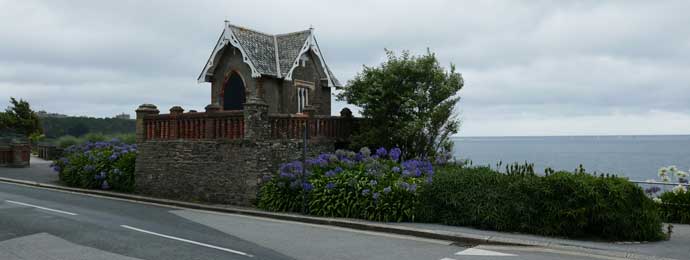I reacted to the tone almost before - okay, before - I heard the words. My friend had known me for - well, at least five years, and we’d never got into politics. But then she had her sudden thought, and the tone of her question would have suited, say, “You’re not an axe murderer, are you?” As if being a Tory is up there - down there - with axe-murdering. And my denial was, I don’t know, an immediate, instinctive response to an accusation. Not a reply to the words. Can’t think of anything I need to be guilty about right now (honest!), but if there is something, clearly I have my denial lined up and ready. Right there next to fight or flight.
I’m not a Tory, as it happens, but I’m not anything else either. Can’t see the sense of it. I’m not Labour nor a Corbynite (different things?) and if we’re sticking with the most-reported parties, I don’t see the point of the other lot. I find it impossible to be an atheist, convenient as that would be, but I can’t find a religion that fits me, either. It so happens that I’m not Jewish. I’m an individual. Lightly brainwashed by media and social media (and education, and societal norms, and peer-group expectations, et cetera; the list could go on), but stuck with whatever that combination of non-compliances makes me.
I’m sorry, but I can’t see political parties as problem-solving, intended-consequence-achieving mechanisms, any more than I can forget that religions were designed and put in place by fallible but (I assume, mostly) well-meaning people (ha ha), not directly by - well. If we’re going to get into my spiritual health, and the state of my soul, I’d rather step past the intermediary (nice outfit, though; must have been expensive) and speak directly to The Deity. No, I don’t mind holding. Does any of that make me unusual? Or am I just the same as everybody else, and we’re we all just getting on with our lives, while the political nonsense buzzes along in the background?
We do need a collection of reasonably intelligent adults prepared to oversee the running of society as we want it run. Okay. I get that. We do need some idea of where we’re going. Yes. But political parties? Really? Today? As if pulling the steering wheel round to the left, and trying to hold it there, after your Significant Other has been holding it firmly to the right - as if that’s a sure way to make the car stay on the road and go forwards in the straight line you want? I can’t see that approach working better than any alternative - or more exactly, I can’t see it holding out against any pressure to evolve into something else. This squabbling mass of party (dis)loyalists - they’re the centre. Can they hold? Given how very badly they’re doing at the moment?
Oh, and populism. We talk about it as though it’s new. French Revolution. Arab Spring. The fall, and actually the dismantling by the crowds who were there, of the Berlin Wall. That recurring theme of an elite that’s lost touch completely. Boris Yeltsin easing Mikhail Gorbachev away from the podium. Populism isn’t a new normal; it’s an old normal reasserting itself. And if that’s true, politics isn’t about which of the tiny little people in our television sets will lead us to the promised land. Because however bright that promise and however fertile that land, enough of the historical precedents suggest that we won’t follow them for long enough to get there. President Macron displaced the two main parties in France in a popular uprising; his popularity has now collapsed. Robespierre would have understood that. Evolution happens. Rapidly sometimes, and painfully.
Thinking about the evolution that might be coming now - given how very badly, etc. - and writing this in the days after Holocaust Memorial Day, I think we should be careful about letting our politics simplify to the point where “Tory!” is an accusation rather than just one of the available positions in a debate. Where “The Brexiteers” are wreckers rather than participants in a democratic process. [Oh, stop! They were issued with ballot papers, and they voted.] Where the democratic rights of probably under-informed (and possibly credulous enough to be deceived by politicians) people come into question. [Ditto!] Do they know enough to be allowed to vote in our election? What are their educational qualifications? Let’s not reach that point - or rather, let’s pull back from it now that we’ve got here.
And on a personal note, I wonder what that split-second denial says about me. “Not me! No!” Would I have denied knowing The Man, for example, three times before the cock crowed? If I’d been standing in a Paris street in 1793, would I have tried to stop the crowd jeering at the aristocrat (Tory?) heading for the guillotine? Or thrown the rock I was given? Would I have agreed with Galileo, say, standing before the Roman Inquisition, that the sun moved around the earth and not the other way round?
And how easy it is, I discover now, to find people online who refute the idea that Galileo said “And yet it moves!” as he left the courtroom. He wasn’t heroic, even under his breath, today’s self-appointed historians take it upon themselves to tell me. How do they know, for one thing, and why do they have to spoil the story for me? Are none of us allowed to be heroes, is that the message? What a cultural evolution this is going to be.

I think that’s right. The future’s unknowable, so I can only find forecasts of what might happen, and they all seem to assume that everything else remains constant. Nobody prepares before, or reacts after. Civil servants sit motionless in their offices (or, looking at the time, sleep peacefully in their beds). In real life, lots of people are preparing, but I’m talking about the forecasts. It’s in the nature of forecasting that you take one thing and assume that it’s the only thing. We wake up on Saturday, 30th March 2019 to a static reality instead of the usual ongoing narrative. Brexit was the cause and this is the effect. Nothing else moves. Change has been cancelled. Events have stopped as well.
To make it absolutely certain that Brexit will bring the static end-state of the so-called United Kingdom, just about every report in the British media now includes the question “Will the EU back down?” or occasionally “Will the EU blink?” If I was an EU negotiator, I’d be stubbornly keeping my eyes open at the moment, stubbornly facing forwards and upwards. I believe that “forward-looking statements” are contentious in financial advertising - because it’s wrong to promise a reward when future performance is unknowable - and I wonder whether we might think about “forward-looking questions” in news reporting.
News, by just about any definition except the one being acted out in the news media at the moment, doesn’t come with a question mark attached to it. No - really - it doesn’t.
Forget Brexit for a moment. Open your eyes. If it’s news you seek, look around you.
See?




